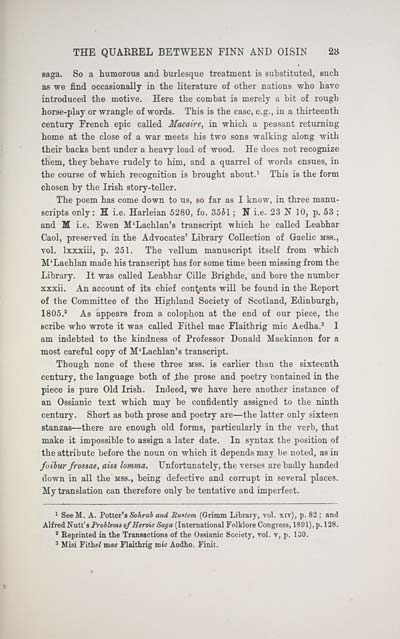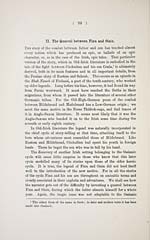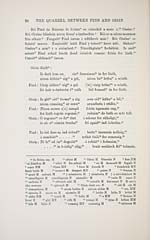Matheson Collection > Fianaigecht
(57)
Download files
Complete book:
Individual page:
Thumbnail gallery: Grid view | List view

THE QUARREL BETWEEN FINN AND OISIN 2'ó
saga. So a humorous and burlesque treatment is substituted, sucb
as we find occasionally in the literature of other nations who have
introduced the motive. Here the combat is merely a bit of rough
horse-play or wrangle of words. This is the case, e.g., in a thirteenth
century French epic called Macaire, in which a peasant returning
home at the close of a war meets his two sons walking along with
their backs bent under a heavy load of wood. He does not recognize
them, they behave rudely to him, and a quarrel of words ensues, in
the course of which recognition is brought about.' This is the form
chosen by the Irish story-teller.
The poem has come down to us, so far as I know, in three manu-
scripts only : H i.e. Harleian 5280, fo. 3551 ; N i.e. 23 N 10, p, 53 ;
and M i.e. Ewen M'Lachlan's transcript which he called Leabhar
Caol, preserved in the Advocates' Library Collection of Gaelic mss.,
vol. Ixxxiii, p. 251. The vellum manuscript itself from which
M'Lachlan made his transcript has for some time been missing from the
Libraiy. It was called Leabhar Cille Brighde, and bore the number
xxxii. An account of its chief cont^ents will be found in the Report
of the Committee of the Highland Society of Scotland, Edinburgh,
1805.* As appears from a colophon at the end of our piece, the
scribe who wrote it was called Fithel mac Flaithrig mic Aedha.' I
am indebted to the kindness of Professor Donald Mackinnon for a
most careful copy of M'Lachlan's transcript.
Though none of these three mss. is earlier than the sixteenth
century, the language both of Jthe prose and poetry contained in the
piece is pure Old Irish. Indeed, we have here another instance of
an Ossianic text which may be confidently assigned to the ninth
century. Short as both prose and poetry are — the latter only sixteen
stanzas — there are enough old forms, particularly in the verb, that
make it impossible to assign a later date. In syntax the position of
the attribute before the noun on which it depends may be noted, as in
fuibur frossae, aiss lomma. Unfortunately, the verses are badly handed
down in all the mss., being defective and corrupt in several places.
My translation can therefore only be tentative and imperfect.
1 SeeM. A. Potter's 5oArai and Ru*tem (Grimm Library, vol. xiv), p. 82 ; and
Alfred Nutt'sProi&wso/ heroic Saga (International Folklore Congress, 1891), p. 128.
' Reprinted in the Transactions of the Ossianic Society, vol. v, p. 130.
2 Misi Tiihel mac Flaithrig mic Aodho. Finit.
saga. So a humorous and burlesque treatment is substituted, sucb
as we find occasionally in the literature of other nations who have
introduced the motive. Here the combat is merely a bit of rough
horse-play or wrangle of words. This is the case, e.g., in a thirteenth
century French epic called Macaire, in which a peasant returning
home at the close of a war meets his two sons walking along with
their backs bent under a heavy load of wood. He does not recognize
them, they behave rudely to him, and a quarrel of words ensues, in
the course of which recognition is brought about.' This is the form
chosen by the Irish story-teller.
The poem has come down to us, so far as I know, in three manu-
scripts only : H i.e. Harleian 5280, fo. 3551 ; N i.e. 23 N 10, p, 53 ;
and M i.e. Ewen M'Lachlan's transcript which he called Leabhar
Caol, preserved in the Advocates' Library Collection of Gaelic mss.,
vol. Ixxxiii, p. 251. The vellum manuscript itself from which
M'Lachlan made his transcript has for some time been missing from the
Libraiy. It was called Leabhar Cille Brighde, and bore the number
xxxii. An account of its chief cont^ents will be found in the Report
of the Committee of the Highland Society of Scotland, Edinburgh,
1805.* As appears from a colophon at the end of our piece, the
scribe who wrote it was called Fithel mac Flaithrig mic Aedha.' I
am indebted to the kindness of Professor Donald Mackinnon for a
most careful copy of M'Lachlan's transcript.
Though none of these three mss. is earlier than the sixteenth
century, the language both of Jthe prose and poetry contained in the
piece is pure Old Irish. Indeed, we have here another instance of
an Ossianic text which may be confidently assigned to the ninth
century. Short as both prose and poetry are — the latter only sixteen
stanzas — there are enough old forms, particularly in the verb, that
make it impossible to assign a later date. In syntax the position of
the attribute before the noun on which it depends may be noted, as in
fuibur frossae, aiss lomma. Unfortunately, the verses are badly handed
down in all the mss., being defective and corrupt in several places.
My translation can therefore only be tentative and imperfect.
1 SeeM. A. Potter's 5oArai and Ru*tem (Grimm Library, vol. xiv), p. 82 ; and
Alfred Nutt'sProi&wso/ heroic Saga (International Folklore Congress, 1891), p. 128.
' Reprinted in the Transactions of the Ossianic Society, vol. v, p. 130.
2 Misi Tiihel mac Flaithrig mic Aodho. Finit.
Set display mode to: Large image | Transcription
Images and transcriptions on this page, including medium image downloads, may be used under the Creative Commons Attribution 4.0 International Licence unless otherwise stated. ![]()
| Early Gaelic Book Collections > Matheson Collection > Fianaigecht > (57) |
|---|
| Permanent URL | https://digital.nls.uk/76711029 |
|---|
| Description | Items from a collection of 170 volumes relating to Gaelic matters. Mainly philological works in the Celtic and some non-Celtic languages. Some books extensively annotated by Angus Matheson, the first Professor of Celtic at Glasgow University. |
|---|
| Description | Selected items from five 'Special and Named Printed Collections'. Includes books in Gaelic and other Celtic languages, works about the Gaels, their languages, literature, culture and history. |
|---|

